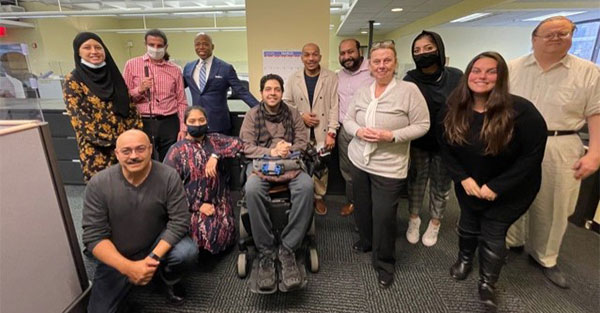
Mayor Adams visits the Mayor's Office for People with Disabilities (photo: @NYCDisabilities)
New York City has an historic opportunity to engage people with disabilities more fully in the workforce. With nearly 1 million New Yorkers living with a disability, seizing the opportunity should be a top priority. It’s time to build a pipeline to address the needs of employers and New Yorkers with disabilities.
The opportunity stems from three simultaneous dynamics: a low unemployment rate nationally; a high unemployment rate for people with disabilities in New York City; and more flexible working arrangements as a result of the remote working necessitated by the COVID-19 pandemic.
According to a recent report by Center for an Urban Future, nearly 17% of New Yorkers of working age with a disability were unemployed in 2021 – up from 7.4% in 2019. “This disastrously high unemployment rate has persisted for much of the past two years,” the report states, “even as the unemployment rate for New Yorkers without a disability has fallen sharply since the summer of 2020.”
New York City’s unemployment rate was 6.2% in June. The U.S. unemployment rate was even lower at 3.6% in June. Job openings nationally totaled 11.3 million at the end of May.
The growing demand for workers, coupled with more flexible working conditions, creates a fertile environment. But preparing people with disabilities to meet the demand often requires training – and, in the case of high-school-age youth – pre-training.
We know that reality well, as we run a nonprofit organization, the Institute for Career Development (ICD), that trains and pre-trains people with disabilities in New York City for career opportunities.
The training covers a broad range of jobs in such areas as building repair, custodial services, human services, retail, and information technology. ICD’s IT Academy, for instance, offers the first fully-accessible certification-based technology training programs for New Yorkers with disabilities.
The challenge, however, is that public investments in career development for people with disabilities are declining even as the opportunity grows. As the report by Center for an Urban Future reveals, New York City funding for programs serving New Yorkers with intellectual and developmental disabilities has plunged 82% over the past two decades, from $70.7 million to $12.6 million.
What New York City needs is a robust pipeline to expand the number of individuals with disabilities in the workforce. That pipeline should have three key components.
First, it should provide specific funding to support the training and pre-training of individuals with disabilities. That funding needs to be earmarked specifically for people with disabilities. Too often workforce training funds include people with disabilities but never actually reach them.
Pre-training is needed to support youth who might otherwise fall through the cracks between schooling and career development. Research recently conducted for the Institute for Career Development by the nonprofit consulting firm The Bridgespan Group identified a significant gap in serving people with disabilities in New York City. That gap is in the transition from school to career, during which school-based support ends and career opportunities – as distinct from job opportunities – have not yet arisen. Filling that gap through pre-training would substantially enhance career opportunities earlier in life.
Second, the pipeline should fund apprenticeships for individuals with disabilities. All too often, interested potential employers have doubts about how well people with disabilities will fit into their work environment. The best way to remove those doubts is to give people with disabilities an opportunity to prove themselves. Let potential employers see for themselves how effectively individuals with disabilities can fulfill the specific job responsibilities required.
It’s especially appropriate to maximize opportunities for people with disabilities at a time when the work environment has adopted the more flexible working conditions – due to the COVID-19 pandemic – that people with disabilities have long advocated. For years, people with disabilities urged greater corporate consideration of work-life balance – with allowances to address family needs or visit a doctor during the day. In the wake of the pandemic, such considerations are now standard practice. It’s only right that people with disabilities should benefit from them as well.
Third, the pipeline should incentivize the hiring of individuals with disabilities. Incentives such as tax benefits for employers or public employment goals should provide the extra push to get employers to embrace the potential of New Yorkers with disabilities.
The federal government, for instance, has a 7% goal for hiring individuals with disabilities. The City of New York should provide incentives to underscore its commitment as well.
The New York City workforce would benefit greatly from fuller engagement of people with disabilities. It’s time for New York City to build the pipeline needed to transport that human energy so that it can revitalize the economy as well as the lives of New Yorkers with disabilities.
***
Diosdado G. Gica and Joseph T. McDonald III are Co-Presidents of the Institute for Career Development, based in New York City.
***
Have an op-ed idea or submission for Gotham Gazette? Email This email address is being protected from spambots. You need JavaScript enabled to view it.




